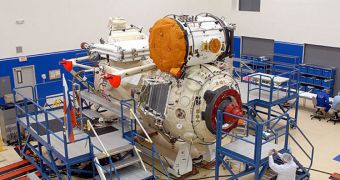As the space shuttle Atlantis is being prepared to take off from the Kennedy Space Center (KSC), in Cape Canaveral, Florida, its most important cargo will be the Russian-built Mini Research Module 1 (MRM-1). This is the second in a series of small research module, and represents one of RosCosmos' final additions to the International Space Station (ISS). The first module, called Poisk (MRM-2), was launched in November 2009, and provided the orbital outpost with its fourth docking port for Soyuz and Progress capsules, Space reports.
The new module is called Rassvet in Russian, which means “dawn.” It is currently being prepared for its flight inside an assembly building in Port Canaveral. More than 100 engineers and other experts from Russia have taken up residence in the complex, as they race to get the precious cargo in good condition. Atlantis is currently scheduled to lift off from Launch Pad 39A at the KSC on May 14, about a month after Discovery's planned April 15 flight. Once in orbit, the shuttle crew will ensure that the module is correctly affixed to the international lab, bringing the total number of Russian docking ports to five.
MRM-1 is to be connected to the Russian-built Zarya control module, officials at NASA announce. The new chamber weighs in excess of 18,000 pounds, and the American space agency is fairing it to orbit as part of a bartering agreement it signed with the Russian Federal Space Agency. In order to make the most of all available space, engineers have placed inside the module about 3,000 pounds of equipment, food, water, fuel and spare parts, which will also be delivered to the station for storage. On one of its sides, the MRM-1 contains a radiator and an airlock.
These tools were added just in case it needs to be relocated from Zarya, when Russia launches its Multi-Purpose Laboratory Module (MPLM) in 2012. The MRM-1 was delivered to Florida about four months ago, in December 2009. It was constructed and assembled by RSC Energia, which is one of the largest Russian aerospace firms. It is in charge with most aspects of the country's manned spaceflight programs, and also builds the Soyuz TMA and Progress M capsules, which deliver astronauts and supplies to the ISS, respectively. The final investigations on the new module will be performed on April 2, when NASA plans to move it to the Space Station Processing Facility.

 14 DAY TRIAL //
14 DAY TRIAL //